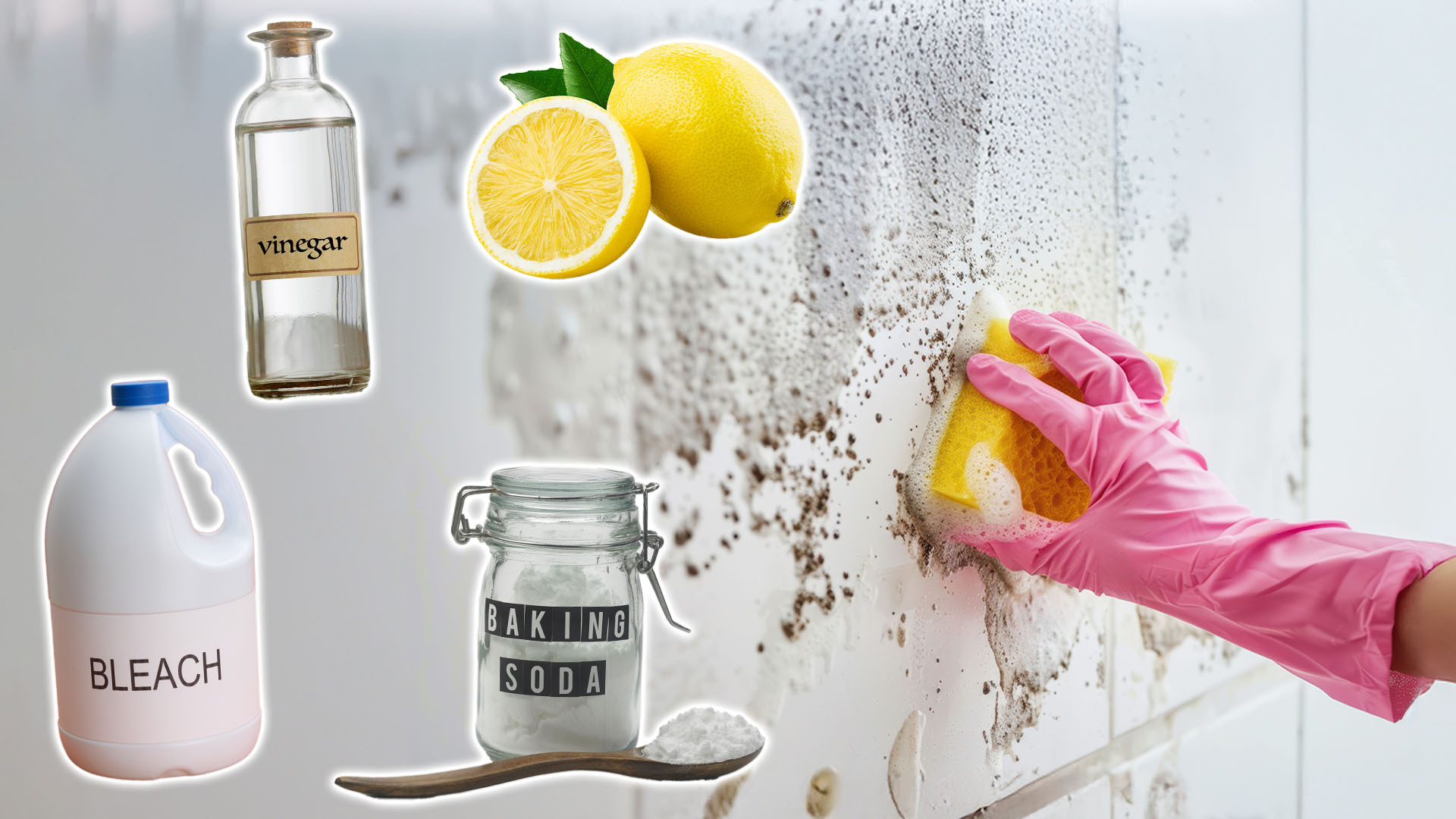Money
My top buys for as little as 30p to keep mould and damp at bay this winter as a cleaning expert

AN EXPERT has revealed the six household products you can buy for at little as 30p to keep mould and damp at bay this winter.
Mould and damp are not just unsightly, they can also cause health problems so it’s important to take action if you spot it in your home.
Jane Wilson, cleaning expert and manager at Fantastic Cleaners, has shared six super-cheap products that can help banish mould from every area of your property.
Mould typically shows up in damp or dark areas such as bathroom and wardrobe corners, ceilings corners, along window sills and on stagnant fabrics as small black and brown dots.
If you catch it quickly, it can be cleaned off and, when you’ve removed it, you can take action to prevent it from returning.
Here are some of Jane’s top buys
White vinegar
White vinegar is a “powerful, natural mould killer”, according to Jane.
And, best of all, it’s readily available from supermarkets and corner stores for just a few pennies.
Both Sainsbury’s and Tesco sell 568ml bottles of white vinegar for just 35p.
Jane recommends pouring undiluted white vinegar into a spray bottle and applying it directly to the mouldy area.
She said that once applied, the vinegar should be left for at least an hour before being scrubbed off with a brush.
After removing the vinegar, wipe the area clean with a damp cloth.
Jane explained that “the acidic nature of vinegar breaks down the mould and prevents its return.”
Baking soda (bicarbonate of soda)
Baking soda is a household staple that’s effective for removing mould.
Jane explains that it is a particularly good choice for using on delicate surfaces.
The cleaning expert explained that as well as being a great cleaner baking soda has antifungal properties to prevent mould from returning.
And, it wont break the bank. Both Sainsbury’s and Morrisons sell bicarbonate of soda for just 59p.
The expert cleaner advised mixing a quarter of a teaspoon of baking soda with water in a spray bottle before shaking well.
Then spray the solution on to the mouldy surface, scrub with a brush and rinse with with water.
After you’ve cleared away the mould Jane advised spraying the area again and letting it dry to prevent future mould growth.
Tea tree oil
Tea tree oil is a natural and highly effective way to remove mould.
A 20ml bottle will set you back £9 from Boots, making it a little pricier, but it will leave a far nicer scent than a cheaper fix.
Jane recommended mixing one teaspoon of tea tree oil with one cup of water in a spray bottle.
Simply spray the solution onto the mould and let it sit without rinsing.
Jane explained that tea tree oil is a natural fungicide making it particularly effective at killing mould spores and preventing their spread.
Lemon juice
Lemon juice has naturally acidic and antibacterial properties that make it great for dealing with mould problems.
Lemons are a particularly cheap way of removing mould.
Morrisons, Tesco, Sainsbury’s and Asda are all selling lemons for 30p each.
Jane recommended squeezing the juice from several lemons and applying it directly to the mouldy area.
Let it sit for a few minutes, then wipe it clean with a damp cloth, or scrub with a brush on tougher areas.
Jane said the added benefit of using lemon juice is the fresh scent it leaves behind.
Cinnamon oil
Cinnamon oil has antifungal properties that can help prevent mould growth.
Amazon has multiple listings for cinnamon oil, which contains cinnamaldehyde to help inhibit mould growth, for around £5.
Jane said it was particularly useful for treating small areas of mould and preventing it from spreading.
She added: “Unlike some stronger-smelling mould cleaners, cinnamon leaves a warm, pleasant aroma, making it a good choice for use in living areas.”
Jane advised mixing a few drops of cinnamon oil with water in a spray bottle.
Spray the mixture directly onto a mouldy area and let it sit for about an hour before wiping the area clean with a damp cloth.
For persistent mould Jane advised reapplying the solution or combining it with other natural cleaners, such as vinegar, for a stronger effect.
She also recommended sprinkling cinnamon powder on mould-prone areas like windowsills or bathrooms to help prevent mould from returning.
Hydrogen peroxide
Hydrogen peroxide is a potent antifungal and antibacterial solution, that’s available online and from some chemists.
Amazon has listings from £3 for 30ml.
Hydrogen peroxide is particularly effective against mould on porous surfaces like wood, drywall, and fabrics, and is safe to use around the home.
Jane advised pouring 3% hydrogen peroxide into a spray bottle and using it to saturate mouldy areas.
Let it sit for 10 minutes then scrub the surface to remove all mould and stains before wiping the area clean with a damp cloth.
What causes mould?
Mould flourishes where there is condensation, which occurs when warm air hits a cooler surface and creates moisture.
Mould spores are present in the air year round and spread when dampness is present for six hours.
In the home this dampness is normally caused by condensation, which occurs while showering, drying clothes or cooking.
Mould can grow anywhere in a property and can be identified as black speckled marks or grey growths on window sills, woodwork, painted walls, ceilings, wallpaper or fabric.
Jane explained that the best way to prevent mould was to keep your home dry and well-ventilated.
She recommended regularly checking areas prone to moisture, like bathrooms, kitchens and basements.
Using a dehumidifier in damp areas can also help reduce the risk of mould growth.
Why should you deal with mould?
Mould is not just unsightly, it can have serious health consequences.
In 2020, youngster Awaab Ishak tragically passed away after living in a one-bedroom housing association flat in Rochdale, Greater Manchester, that was riddled with mould.
If you find any signs of mould or spreading damp, it’s vital to act quickly.
Government guidance states: “Damp and mould primarily affect the airways and lungs, but they can also affect the eyes and skin. The respiratory effects of damp and mould can cause serious illness and, in the most severe cases, death.”
As well as the dangers to your health, mould can cause damage to your home, and leaving it for longer will only end up costing you more to fix it later.
Common Bathroom Habits That Increase Mould

Plumbworld, a leading expert in bathroom and kitchen products, has shared the daily habits that increase the chance of mould growing in homes.
Leaving wet towels and bathmats on floor
Wet towels and bathmats on the floors after a shower or bath can increase humidity levels which provides a perfect breeding ground for mould spores.
To prevent this, hang towels and bathmats in an area where they can dry quickly and to wash them regularly.
Not turning on the fan
An exhaust fan is critical in reducing moisture levels in the bathroom.
When taking a hot shower or bath, steam increases the room’s humidity level, creating an ideal setting for mould to flourish on walls, ceilings, and other surfaces.
An exhaust fan helps by moving the moist air outside, significantly reducing the risk of mould growth.
Experts suggest running the fan during the shower and for at least 20-30 minutes afterwards to lower humidity levels.
Ignoring small leaks
Even minor leaks from the sink, toilet, or shower can contribute to increased moisture levels in a bathroom, fostering an environment where mould can thrive.
Over time, these leaks can cause significant water damage, promoting mould growth in less visible areas such as inside walls or under flooring.
Fix leaks promptly to prevent mould and potential structural damage.
Keeping shower curtains or doors closed
Keeping the shower area closed after use traps moisture inside, delaying the drying process and creating a humid environment conducive to mould growth.
Mould can easily develop on shower curtains, doors, and in tile grout if they remain wet for too long.
To avoid this, leave the shower door or curtain open after use to improve air circulation and allow the area to dry more quickly.
Storing too many products
Shower caddies and corners filled with bottles and accessories may seem harmless, but they can obstruct airflow and trap moisture and creates hidden, moist niches where mould can grow unnoticed.
Keep shampoo and shower gel bottles to a minimum, and regularly clean and dry the areas underneath them to prevent mould growing.
Do you have a money problem that needs sorting? Get in touch by emailing money-sm@news.co.uk.
Plus, you can join our Sun Money Chats and Tips Facebook group to share your tips and stories
Money
UK’s cheapest supermarket for a weekly shop in September revealed – can you save cash?

THE UK’s cheapest supermarket for a weekly shop in September has been revealed – and it’s not Lidl or Asda.
Which? found German discounter Aldi to be the most affordable out of a list of eight major chains last month.
The UK’s consumer champion looked at how the retailers’ prices compared on a shopping list of 59 products, to represent doing a weekly shop.
The list of 59 included both branded and non-branded items including Birds Eye Peas, Hovis bread, milk and butter.
Which?’s analysis also included special offer prices and loyalty prices where possible, but not multi-buys such as buy one get one free.
The consumer champion found Aldi came out cheapest ahead of Lidl, Asda, Tesco and Sainsbury’s with the basket costing £102.68.
The supermarket also pipped Morrisons, Ocado and Waitrose to first spot.
Asda’s basket of 59 goods came in just a fraction more expensive than Aldi, costing £103.86.
Asda was next, with its shopping list costing £112.19.
Tesco’s basket, with Clubcard, was £112.96, and without loyalty pricing it was £113.35.
Sainsbury’s shopping basket, for Nectar Card customers, was £113.79, then Morrisons was next, coming in at £119.18.
Sainsbury’s without a Nectar Card was £119.19, then Ocado and Waitrose came in bottom of the pack, with their baskets costing £125.16 and £130.37 respectively.
Ele Clark, Which? retail editor, said: “Our latest monthly analysis once again sees Aldi crowned as the UK’s cheapest supermarket.
“Given the ongoing strain of high food prices on household budgets, it’s understandable that many people are choosing discounters to cut costs.
“By switching supermarkets, consumers could save 21%, highlighting the advantages of shopping around.”
It’s worth bearing in mind, the research carried out by Which? was based on prices for the list of 59 products across just September.
That means they are just a snapshot of what you might pay for them at different times of the year.
How to save money on your supermarket shop
THERE are plenty of ways to save on your grocery shop.
You can look out for yellow or red stickers on products, which show when they’ve been reduced.
If the food is fresh, you’ll have to eat it quickly or freeze it for another time.
Making a list should also save you money, as you’ll be less likely to make any rash purchases when you get to the supermarket.
Going own brand can be one easy way to save hundreds of pounds a year on your food bills too.
This means ditching “finest” or “luxury” products and instead going for “own” or value” type of lines.
Plenty of supermarkets run wonky veg and fruit schemes where you can get cheap prices if they’re misshapen or imperfect.
For example, Lidl runs its Waste Not scheme, offering boxes of 5kg of fruit and vegetables for just £1.50.
If you’re on a low income and a parent, you may be able to get up to £442 a year in Healthy Start vouchers to use at the supermarket too.
Plus, many councils offer supermarket vouchers as part of the Household Support Fund.
Prices at supermarkets change frequently, sometimes daily, and you will find items on offer in one chain one week then in another the following week.
However, in Which?’s survey of a larger basket of goods it was Asda that came out top of the survey.
The comparison looks at 164 items – but it doesn’t include Aldi and Lidl as they don’t offer large enough ranges in shops.
Asda came top of the list with this basket costing £418.88 – but Tesco (with Clubard prices) was just 1p more expensive.
An Asda spokesperson said: “Asda is consistently recognised as the best-value supermarket for the big shop in independent price comparison surveys, including the Grocer 33 basket comparison and the Which? monthly big shop trolley comparison.
“This is despite these surveys including other retailers’ loyalty schemes but not Asda Rewards.”
It’s also worth factoring in that Which? looked at loyalty pricing for Lidl, Tesco, Sainsbury’s, Morrisons and Waitrose, but only Tesco and Sainsbury’s had items on its chosen shopping list with a loyalty price in September.
Meanwhile, Asda doesn’t have two-tier loyalty pricing. Its loyalty scheme is based on points and personalised rewards, not lower prices for every scheme member which meant Which? didn’t include the retailer’s loyalty scheme prices.
It’s not the first time in recent months Aldi has come out on top of Which?’s cheapest supermarket survey.
The German discounter, which is looking to massively expand its physical store presence across the UK, was crowned the cheapest supermarket in August, July and June.
It was also crowned the cheapest supermarket of 2023, pipping the other major chains including Lidl, Asda and Sainsbury’s to the top spot.
The Sun asked Tesco, Sainsbury’s, Ocado and Waitrose to comment.
A Morrisons spokesperson said it was “working hard to keep prices down and competitive for our customers”.
They added: “Our More Card members can also earn points on selected purchases, including fuel, and redeem those points for fivers off their shopping.
“They also benefit from market-leading discounts on over 2,000 branded and essential items across fridge, freezer and cupboard fillers as well as personalised offers and surprises.”
A Waitrose spokesperson said: “We’re committed to keeping prices low for customers and remain focused on giving our customers great value for money.
“We have invested in prices without compromising on quality or our industry-leading animal welfare standards.
“Which’s price comparison also excludes multibuy offers, which are extremely popular amongst our customers for both our branded and own-branded products.”
The retailer added that it had reduced prices on its No.1 range which was recently relaunched.
What is loyalty pricing?
Loyalty schemes are all the rage, but what is loyalty pricing? Here is everything you need to know…
Sainsbury’s, Tesco and Morrisons are three of the major supermarkets that offer customers loyalty pricing – where you can get discounts on certain products.
They’re all free to sign up to as well, so the obvious advantage is that you can save money without spending a penny.
Different supermarkets will offer exclusive discounts on different products, so it’s worth seeing which suits your weekly shop the best.
Either way, be wary of supermarkets artificially inflating the price of their goods to make it seem like you’re getting a better deal than you are.
Consumer group Which? has previously found Sainsbury’s and Tesco to have increased the price of everyday goods then slapped loyalty prices on them thinking customers wouldn’t notice.
In any case, it’s worth shopping around even if you’re getting your weekly basket from a supermarket that offers loyalty pricing.
Supermarkets change their prices all the time, sometimes multiple times daily, so it’s worth checking you’re getting the best price on an item.
You can use websites like Trolley to see how the major supermarket’s compare in terms of price on any number of goods.
Do you have a money problem that needs sorting? Get in touch by emailing money-sm@news.co.uk.
Plus, you can join our Sun Money Chats and Tips Facebook group to share your tips and stories
CryptoCurrency
Tesla stock drops 3% after Q3 deliveries fall short of estimates

Tesla (TSLA) announced third quarter deliveries on Wednesday that slightly missed expectations, sending the stock down about 3%.
The EV maker delivered 462,890 vehicles in the three months ending Sept. 30, up 6.4% quarter over quarter to mark the first quarter of delivery growth this year. The numbers also came in ahead of the 435,059 EVs the company delivered in the year-ago period.
Wall Street had expected Tesla to deliver closer to 463,897, according to Bloomberg.
The Model 3 and Model Y represented the bulk of Tesla’s overall total, with those two vehicles combining for 439,975 deliveries.
Prior to the delivery numbers’ release, Tesla stock had been up around 20% in the past month, fueled by optimism about its upcoming robotaxi event on Oct. 10 and good news coming out of China indicating rising sales there.
But investors have also debated a “notably lower” annual vehicle growth rate, which Tesla warned about after the first quarter.
The company is currently dealing with stiff competition in China from Chinese automakers like BYD and Xpeng. Recent price cuts have also squeezed profit margins as competition intensifies.
Analysts have said next week’s robotaxi event will serve as a pivotal moment for the company’s future and its plans to further utilize artificial intelligence.
“We believe Robotaxi Day will be seminal and historical day for Musk and Tesla and marks a new chapter of growth around autonomous, FSD, and AI future at Tesla,” Wedbush analyst Dan Ives wrote in a note to clients on Tuesday.
Tesla will report third quarter earnings on Oct. 23.
Alexandra is a Senior Reporter at Yahoo Finance. Follow her on X @alliecanal8193 and email her at alexandra.canal@yahoofinance.com
Pras Subramanian is a reporter for Yahoo Finance. You can follow him on Twitter and on Instagram.
Click here for the latest stock market news and in-depth analysis, including events that move stocks
Read the latest financial and business news from Yahoo Finance
CryptoCurrency
FTX bankruptcy estate auctioning Worldcoin tokens this week


According to CoinGecko, Worldcoin currently has a market capitalization of approximately $792 million and a 494 million circulating supply.
CryptoCurrency
SEC files appeal in Ripple lawsuit


The Securities and Exchange Commission first filed the lawsuit against Ripple Labs and both its founders in December 2020.
CryptoCurrency
Fantom price gains 70% in 30 days — What’s driving FTM?


Fantom price defies the crypto market downtrend as traders anticipate a new token launch and mainnet upgrade.
CryptoCurrency
Crypto lawyers on Telegram CEO Pavel Durov’s ‘crimes’ — Is it legal?


Was it right to arrest Telegram founder Pavel Durov? Or is it like arresting a telco CEO because criminals discussed crime on a phone call?
-

 Womens Workouts1 week ago
Womens Workouts1 week ago3 Day Full Body Women’s Dumbbell Only Workout
-

 Technology2 weeks ago
Technology2 weeks agoWould-be reality TV contestants ‘not looking real’
-

 Science & Environment2 weeks ago
Science & Environment2 weeks agoHow to unsnarl a tangle of threads, according to physics
-

 Science & Environment2 weeks ago
Science & Environment2 weeks agoMaxwell’s demon charges quantum batteries inside of a quantum computer
-

 Science & Environment2 weeks ago
Science & Environment2 weeks agoHyperelastic gel is one of the stretchiest materials known to science
-

 Science & Environment2 weeks ago
Science & Environment2 weeks ago‘Running of the bulls’ festival crowds move like charged particles
-

 News2 weeks ago
News2 weeks agoOur millionaire neighbour blocks us from using public footpath & screams at us in street.. it’s like living in a WARZONE – WordupNews
-

 Science & Environment2 weeks ago
Science & Environment2 weeks agoHow to wrap your mind around the real multiverse
-

 Science & Environment2 weeks ago
Science & Environment2 weeks agoLiquid crystals could improve quantum communication devices
-

 Science & Environment2 weeks ago
Science & Environment2 weeks agoSunlight-trapping device can generate temperatures over 1000°C
-

 Science & Environment2 weeks ago
Science & Environment2 weeks agoITER: Is the world’s biggest fusion experiment dead after new delay to 2035?
-

 Science & Environment2 weeks ago
Science & Environment2 weeks agoPhysicists are grappling with their own reproducibility crisis
-

 Science & Environment2 weeks ago
Science & Environment2 weeks agoQuantum ‘supersolid’ matter stirred using magnets
-

 News2 weeks ago
News2 weeks agoYou’re a Hypocrite, And So Am I
-

 Science & Environment2 weeks ago
Science & Environment2 weeks agoWhy this is a golden age for life to thrive across the universe
-

 Science & Environment2 weeks ago
Science & Environment2 weeks agoQuantum forces used to automatically assemble tiny device
-

 Sport2 weeks ago
Sport2 weeks agoJoshua vs Dubois: Chris Eubank Jr says ‘AJ’ could beat Tyson Fury and any other heavyweight in the world
-

 Science & Environment2 weeks ago
Science & Environment2 weeks agoCaroline Ellison aims to duck prison sentence for role in FTX collapse
-

 Science & Environment2 weeks ago
Science & Environment2 weeks agoNuclear fusion experiment overcomes two key operating hurdles
-

 Science & Environment2 weeks ago
Science & Environment2 weeks agoNerve fibres in the brain could generate quantum entanglement
-

 Science & Environment2 weeks ago
Science & Environment2 weeks agoTime travel sci-fi novel is a rip-roaringly good thought experiment
-

 Science & Environment2 weeks ago
Science & Environment2 weeks agoLaser helps turn an electron into a coil of mass and charge
-
News2 weeks ago
the pick of new debut fiction
-

 News2 weeks ago
News2 weeks agoIsrael strikes Lebanese targets as Hizbollah chief warns of ‘red lines’ crossed
-

 CryptoCurrency2 weeks ago
CryptoCurrency2 weeks agoCardano founder to meet Argentina president Javier Milei
-

 Science & Environment2 weeks ago
Science & Environment2 weeks agoMeet the world's first female male model | 7.30
-

 Womens Workouts2 weeks ago
Womens Workouts2 weeks agoBest Exercises if You Want to Build a Great Physique
-

 News2 weeks ago
News2 weeks agoWhy Is Everyone Excited About These Smart Insoles?
-
Business2 weeks ago
JPMorgan in talks to take over Apple credit card from Goldman Sachs
-

 Science & Environment2 weeks ago
Science & Environment2 weeks agoA slight curve helps rocks make the biggest splash
-

 News2 weeks ago
News2 weeks ago▶️ Media Bias: How They Spin Attack on Hezbollah and Ignore the Reality
-

 Science & Environment2 weeks ago
Science & Environment2 weeks agoQuantum time travel: The experiment to ‘send a particle into the past’
-

 Science & Environment2 weeks ago
Science & Environment2 weeks agoWhy we need to invoke philosophy to judge bizarre concepts in science
-

 CryptoCurrency2 weeks ago
CryptoCurrency2 weeks agoBitcoin miners steamrolled after electricity thefts, exchange ‘closure’ scam: Asia Express
-

 CryptoCurrency2 weeks ago
CryptoCurrency2 weeks agoDorsey’s ‘marketplace of algorithms’ could fix social media… so why hasn’t it?
-

 CryptoCurrency2 weeks ago
CryptoCurrency2 weeks agoDZ Bank partners with Boerse Stuttgart for crypto trading
-

 CryptoCurrency2 weeks ago
CryptoCurrency2 weeks agoBitcoin bulls target $64K BTC price hurdle as US stocks eye new record
-

 CryptoCurrency2 weeks ago
CryptoCurrency2 weeks agoLow users, sex predators kill Korean metaverses, 3AC sues Terra: Asia Express
-

 CryptoCurrency2 weeks ago
CryptoCurrency2 weeks agoEthereum is a 'contrarian bet' into 2025, says Bitwise exec
-

 Womens Workouts2 weeks ago
Womens Workouts2 weeks agoEverything a Beginner Needs to Know About Squatting
-

 News2 weeks ago
News2 weeks agoFour dead & 18 injured in horror mass shooting with victims ‘caught in crossfire’ as cops hunt multiple gunmen
-

 Womens Workouts1 week ago
Womens Workouts1 week ago3 Day Full Body Toning Workout for Women
-

 Travel1 week ago
Travel1 week agoDelta signs codeshare agreement with SAS
-

 Politics1 week ago
Politics1 week agoHope, finally? Keir Starmer’s first conference in power – podcast | News
-

 Health & fitness2 weeks ago
Health & fitness2 weeks agoThe maps that could hold the secret to curing cancer
-

 Science & Environment2 weeks ago
Science & Environment2 weeks agoA new kind of experiment at the Large Hadron Collider could unravel quantum reality
-

 Science & Environment2 weeks ago
Science & Environment2 weeks agoFuture of fusion: How the UK’s JET reactor paved the way for ITER
-

 CryptoCurrency2 weeks ago
CryptoCurrency2 weeks agoRedStone integrates first oracle price feeds on TON blockchain
-

 Sport2 weeks ago
Sport2 weeks agoUFC Edmonton fight card revealed, including Brandon Moreno vs. Amir Albazi headliner
-

 CryptoCurrency2 weeks ago
CryptoCurrency2 weeks agoBlockdaemon mulls 2026 IPO: Report
-

 Technology2 weeks ago
Technology2 weeks agoiPhone 15 Pro Max Camera Review: Depth and Reach
-

 News2 weeks ago
News2 weeks agoBrian Tyree Henry on voicing young Megatron, his love for villain roles
-

 CryptoCurrency2 weeks ago
CryptoCurrency2 weeks agoCoinbase’s cbBTC surges to third-largest wrapped BTC token in just one week
-

 Servers computers1 week ago
Servers computers1 week agoWhat are the benefits of Blade servers compared to rack servers?
-

 Technology5 days ago
Technology5 days ago‘From a toaster to a server’: UK startup promises 5x ‘speed up without changing a line of code’ as it plans to take on Nvidia, AMD in the generative AI battlefield
-

 Health & fitness2 weeks ago
Health & fitness2 weeks agoThe secret to a six pack – and how to keep your washboard abs in 2022
-

 Science & Environment2 weeks ago
Science & Environment2 weeks agoBeing in two places at once could make a quantum battery charge faster
-

 Science & Environment2 weeks ago
Science & Environment2 weeks agoHow one theory ties together everything we know about the universe
-

 Science & Environment2 weeks ago
Science & Environment2 weeks agoUK spurns European invitation to join ITER nuclear fusion project
-

 Science & Environment2 weeks ago
Science & Environment2 weeks agoHow do you recycle a nuclear fusion reactor? We’re about to find out
-

 Science & Environment2 weeks ago
Science & Environment2 weeks agoTiny magnet could help measure gravity on the quantum scale
-

 CryptoCurrency2 weeks ago
CryptoCurrency2 weeks agoCrypto scammers orchestrate massive hack on X but barely made $8K
-

 CryptoCurrency2 weeks ago
CryptoCurrency2 weeks agoTelegram bot Banana Gun’s users drained of over $1.9M
-

 CryptoCurrency2 weeks ago
CryptoCurrency2 weeks agoVonMises bought 60 CryptoPunks in a month before the price spiked: NFT Collector
-

 CryptoCurrency2 weeks ago
CryptoCurrency2 weeks ago‘No matter how bad it gets, there’s a lot going on with NFTs’: 24 Hours of Art, NFT Creator
-

 CryptoCurrency2 weeks ago
CryptoCurrency2 weeks agoSEC asks court for four months to produce documents for Coinbase
-
Business2 weeks ago
How Labour donor’s largesse tarnished government’s squeaky clean image
-

 News2 weeks ago
News2 weeks agoBrian Tyree Henry on voicing young Megatron, his love for villain roles
-

 Womens Workouts2 weeks ago
Womens Workouts2 weeks agoHow Heat Affects Your Body During Exercise
-

 Womens Workouts2 weeks ago
Womens Workouts2 weeks agoKeep Your Goals on Track This Season
-

 Science & Environment2 weeks ago
Science & Environment2 weeks agoCNN TÜRK – 🔴 Canlı Yayın ᴴᴰ – Canlı TV izle
-

 Technology1 week ago
Technology1 week agoRobo-tuna reveals how foldable fins help the speedy fish manoeuvre
-

 Science & Environment1 week ago
Science & Environment1 week agoX-rays reveal half-billion-year-old insect ancestor
-

 News2 weeks ago
News2 weeks agoChurch same-sex split affecting bishop appointments
-

 Technology2 weeks ago
Technology2 weeks agoFivetran targets data security by adding Hybrid Deployment
-

 CryptoCurrency2 weeks ago
CryptoCurrency2 weeks agoLouisiana takes first crypto payment over Bitcoin Lightning
-

 CryptoCurrency2 weeks ago
CryptoCurrency2 weeks ago$12.1M fraud suspect with ‘new face’ arrested, crypto scam boiler rooms busted: Asia Express
-

 CryptoCurrency2 weeks ago
CryptoCurrency2 weeks agoDecentraland X account hacked, phishing scam targets MANA airdrop
-

 CryptoCurrency2 weeks ago
CryptoCurrency2 weeks agoBitcoin price hits $62.6K as Fed 'crisis' move sparks US stocks warning
-

 CryptoCurrency2 weeks ago
CryptoCurrency2 weeks agoCertiK Ventures discloses $45M investment plan to boost Web3
-

 CryptoCurrency2 weeks ago
CryptoCurrency2 weeks agoBeat crypto airdrop bots, Illuvium’s new features coming, PGA Tour Rise: Web3 Gamer
-

 CryptoCurrency2 weeks ago
CryptoCurrency2 weeks ago‘Silly’ to shade Ethereum, the ‘Microsoft of blockchains’ — Bitwise exec
-

 CryptoCurrency2 weeks ago
CryptoCurrency2 weeks agoVitalik tells Ethereum L2s ‘Stage 1 or GTFO’ — Who makes the cut?
-

 CryptoCurrency2 weeks ago
CryptoCurrency2 weeks agoEthereum falls to new 42-month low vs. Bitcoin — Bottom or more pain ahead?
-
Business2 weeks ago
Thames Water seeks extension on debt terms to avoid renationalisation
-
Politics2 weeks ago
‘Appalling’ rows over Sue Gray must stop, senior ministers say | Sue Gray
-

 Politics2 weeks ago
Politics2 weeks agoLabour MP urges UK government to nationalise Grangemouth refinery
-

 News2 weeks ago
News2 weeks agoBrian Tyree Henry on his love for playing villains ahead of “Transformers One” release
-
Politics2 weeks ago
UK consumer confidence falls sharply amid fears of ‘painful’ budget | Economics
-

 Womens Workouts2 weeks ago
Womens Workouts2 weeks agoWhich Squat Load Position is Right For You?
-

 TV2 weeks ago
TV2 weeks agoCNN TÜRK – 🔴 Canlı Yayın ᴴᴰ – Canlı TV izle
-

 News7 days ago
News7 days agoUS Newspapers Diluting Democratic Discourse with Political Bias
-

 Politics2 weeks ago
Politics2 weeks agoTrump says he will meet with Indian Prime Minister Narendra Modi next week
-

 Technology2 weeks ago
Technology2 weeks agoIs carbon capture an efficient way to tackle CO2?
-

 Technology2 weeks ago
Technology2 weeks agoCan technology fix the ‘broken’ concert ticketing system?
-

 Science & Environment2 weeks ago
Science & Environment2 weeks agoSingle atoms captured morphing into quantum waves in startling image
-

 Science & Environment2 weeks ago
Science & Environment2 weeks agoHow Peter Higgs revealed the forces that hold the universe together
-

 Science & Environment2 weeks ago
Science & Environment2 weeks agoA tale of two mysteries: ghostly neutrinos and the proton decay puzzle
-

 CryptoCurrency2 weeks ago
CryptoCurrency2 weeks ago2 auditors miss $27M Penpie flaw, Pythia’s ‘claim rewards’ bug: Crypto-Sec
-

 CryptoCurrency2 weeks ago
CryptoCurrency2 weeks agoJourneys: Robby Yung on Animoca’s Web3 investments, TON and the Mocaverse



You must be logged in to post a comment Login